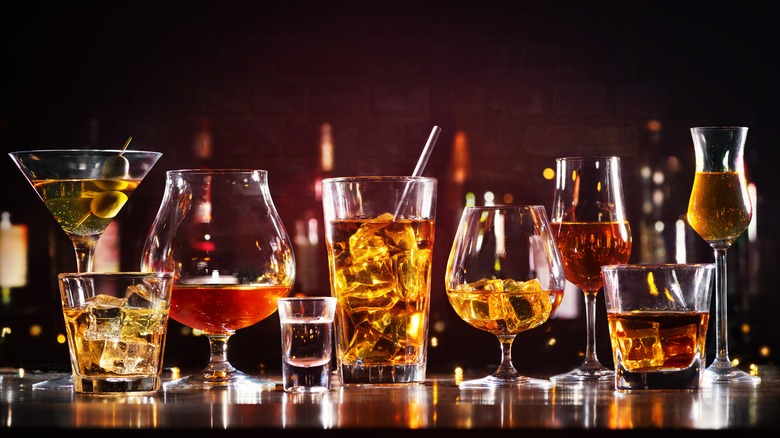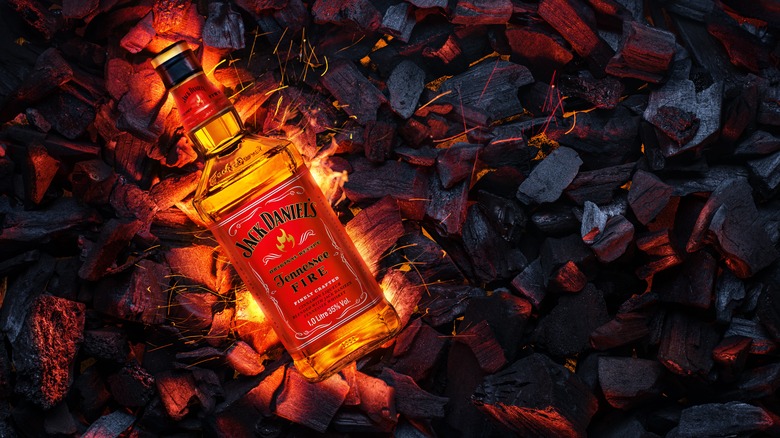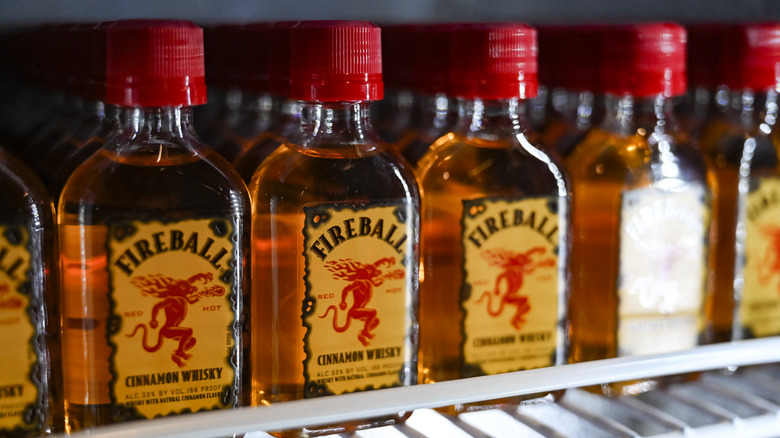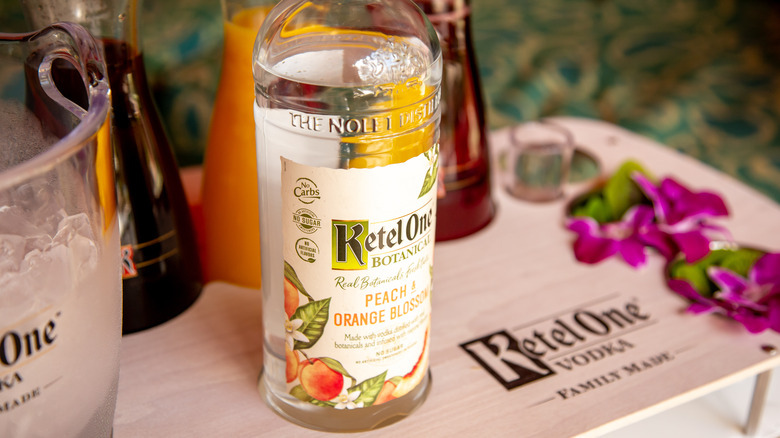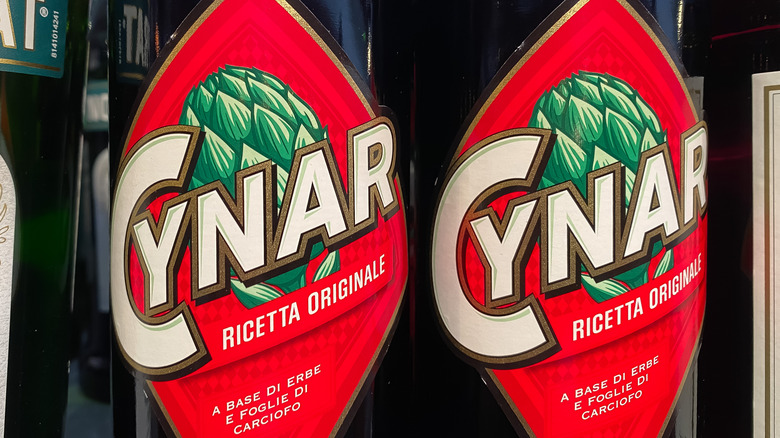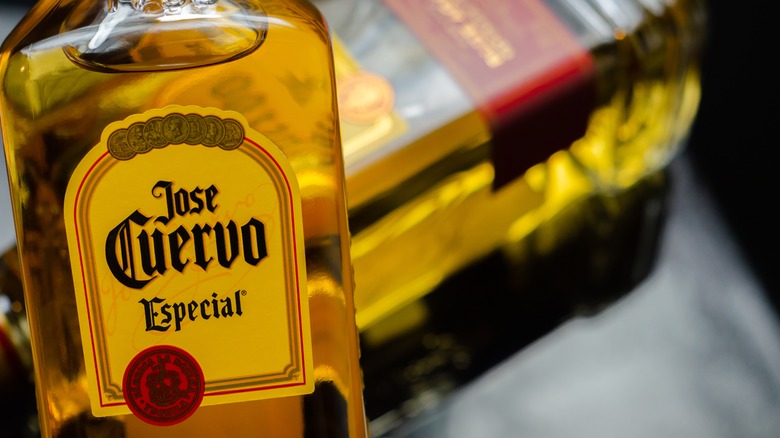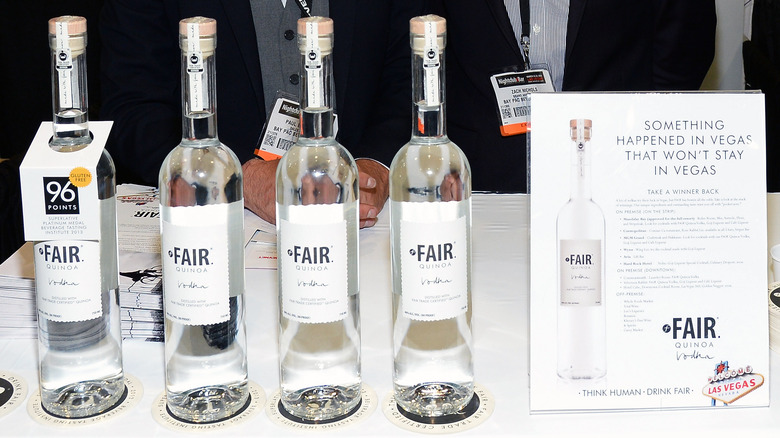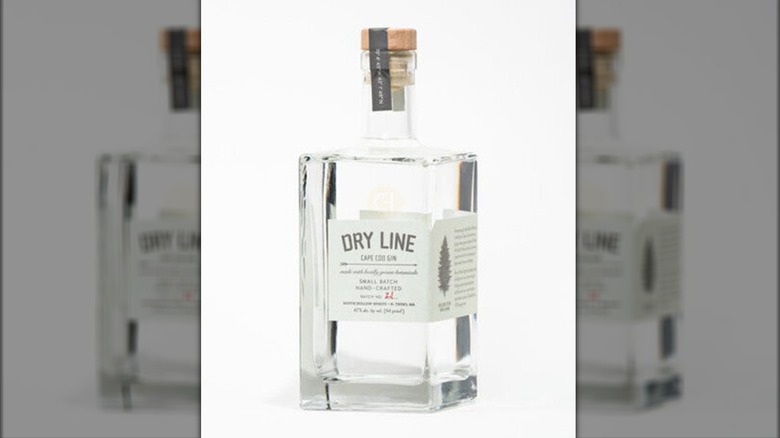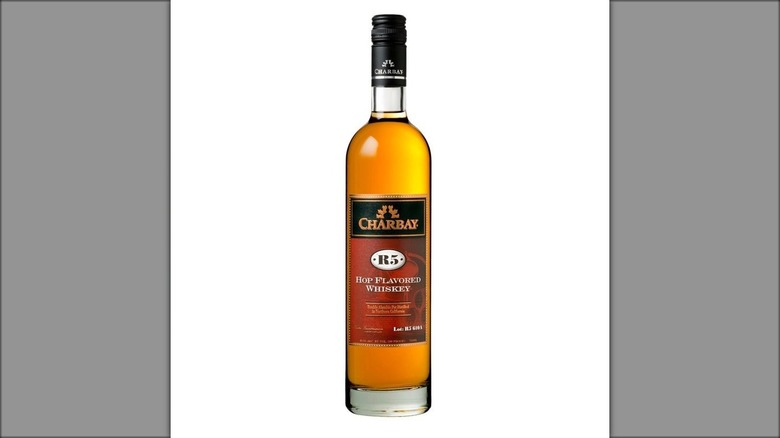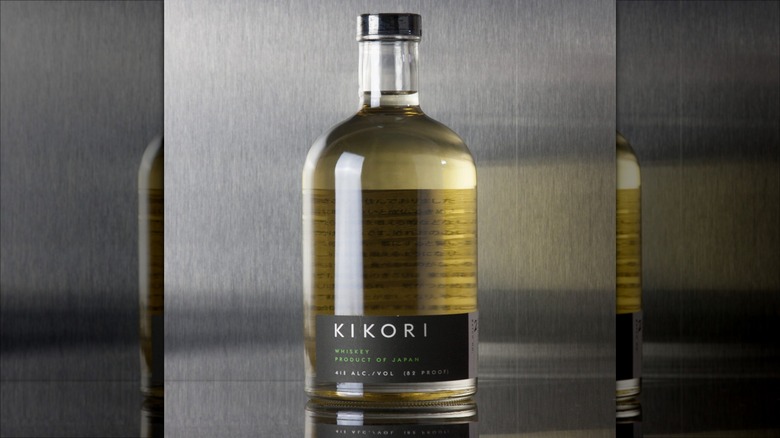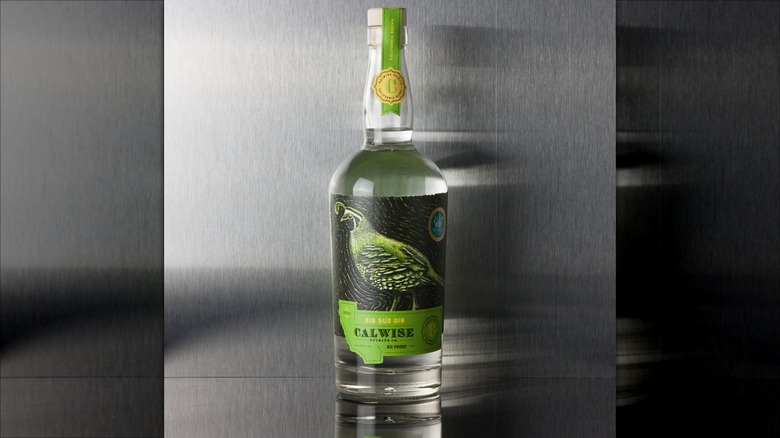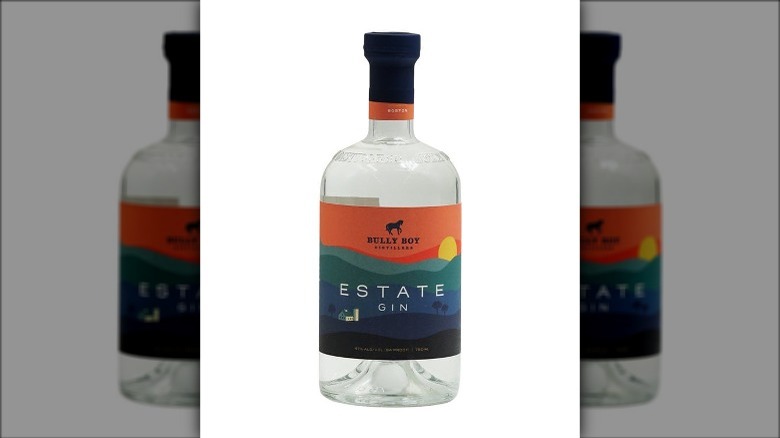Secret Ingredients You Might Not Realize Are Used To Make These Popular Alcohols
When it comes to the way certain alcohols are made, you may think the process is fairly straightforward. After all, it's pretty common knowledge that vodka is — at least traditionally — made from potatoes, whiskey from corn or barley, tequila from agave, and so on. But you might be surprised to find out that this is not always the case. Many modern innovations in technology and distillation have led to some truly intriguing — and in some cases even shocking — takes on traditional recipes.
The health community remains divided over whether or not alcohol consumption is actually good for you — if the comprehensive study published in the journal Alcohol Research and Health is any indicator. But there's no denying that most of us have, at some point, enjoyed indulging in our favorite libation or two and will continue to do so. And from charcoal to unexpected fruits to unsavory chemicals, some of those crowd-favorite alcohols are far more complicated than their marketing may lead us to believe. Read on to find out if your go-to spirit has made our list of liquors containing secret — or at least unusual — ingredients.
Jack Daniel's - charcoal
When it comes to Tennessee whiskey, no name comes to mind quite as readily as Jack Daniel's. It's incredibly smooth with a smoky, spicy taste and a sweet finish — no wonder the brand sold over 14 million cases in 2022 alone. But the secret ingredient that lends the whiskey its smooth trademark taste may surprise you: charcoal.
It's a process commonly known as charcoal mellowing, though as noted by the company itself, the state of Tennessee prefers the term "Lincoln County Process." Once the young whiskey has been distilled to 140-proof, it's filtered through a vat of charcoal — a process that generally takes anywhere from three to five days — before going into the barrel for aging. The process removes impurities and increases the spirit's smoothness, though you're unlikely to find traces of actual charcoal inside your average ready-to-buy bottle of Jack. The process has become so ubiquitous within the industry that hardly any self-respecting "Tennessee whiskey" is produced without the process of charcoal mellowing.
Fireball Cinnamon Whisky - propylene glycol
When you think of cinnamon-flavored whiskey, probably the first brand that comes to mind is Fireball. The popular liquor is a blend of Canadian whiskey, cinnamon flavors, and sweeteners produced by the Sazerac Company — which itself owns over 450 other brands across the world. To the manufacturers' credit, not everything really in Fireball whiskey is questionable. It does contain natural cinnamon flavor, meaning the spirit's spicy bite comes directly from natural cinnamon bark. However, Fireball also contains a whopping 11 grams of sugar per 1.5-ounce serving, as well as some other unsavory ingredients.
And at the top of that suspicious list, we have propylene glycol, a preservative that can be found in more than a few products across the U.S., including cosmetics, soaps, deodorants, industrial solvents, and antifreeze. Although the FDA allows a certain amount of the chemical in American foods, the substance is banned in the European Union. The EU restrictions even led to Fireball being pulled from European shelves in 2014 due to the presence of propylene glycol levels that were deemed unsafe for consumption. To its credit, the company claims that Fireball Cinnamon Whisky no longer contains propylene glycol. However, that likely doesn't apply to any dusty bottles of the spirit manufactured prior to the EU scandal that might remain somewhere in your liquor cabinet.
Ketel One Vodka - charcoal
In case you haven't noticed, the U.S. likes its vodka — so much so that U.S. consumers bought 80.6 million 9-liter cases in 2022 alone, making it the top-selling spirit in the country. While the connoisseurs debate which vodka brand constitutes "the best," there's no denying that Ketel One is certainly one of the most popular — you'll hardly find a well-stocked bar shelf without one or two or more of the brand's products. Manufactured from 100% wheat at the brand's Nolet Distillery in Schiedam, Netherlands, Ketel One is known for its delicate flavor profile and smooth mouthfeel.
Not surprisingly, the spirit owes its favored taste to one very specific ingredient. Much like Jack Daniel's and its "Lincoln County Process" for distilling the world-famous whiskey, Ketel One uses charcoal filtration to achieve the silky smoothness that the spirit is known for. The charcoal removes impurities from the young vodka and results in a clean and crisp flavor that no doubt contributed to its 2022 U.S. sales figure of 2.53 million cases.
Cynar - artichokes
It may not yet sit at the same level of popularity as other liqueurs owned by the Campari Group, but Cynar (pronounced: CHEE-nar) is finally starting to gain traction outside of Italy, popping up in more and more cocktail recipes and bar shelves here in the U.S. For the unfamiliar, Cynar is an Italian aperitif manufactured using a secret blend of 13 herbs and botanicals. In production since 1952, the liqueur is both sweet and bitter, with a pungent herbal flavor. The original recipe contains 16.5% alcohol by volume (ABV), though it is also available in a 70-proof variety for those who prefer a stronger drink.
Though the Campari Group prefers to keep its 13-ingredient herbal blend a secret, the liqueur's main ingredient is anything but: artichokes. You might think artichokes' nutritious hearts would be more at home as an oven-roasted side or even incorporated into a salad or pizza than as an alcoholic drink, but if anything, Cynar proves just how versatile and underrated the artichoke truly is. While the liqueur's flavor is certainly reminiscent of its namesake vegetable (scientifically, artichokes are known as Cynara cardunculus), it's hardly overwhelming, and Campari Group's secret recipe serves to mellow out any unpleasantly sharp tastes.
Jose Cuervo Tequila - corn syrup
It's hard to think of a brand name more universally tied to tropical nectar that is tequila than Jose Cuervo. Marketed as "the world's oldest tequila," Jose Cuervo's agave-based spirits have been in production since 1795, when King Carlos IV of Spain issued the very first license to produce and distribute tequila via royal decree. Since the 18th century, Jose Cuervo has manufactured countless tequila products, earning a reputation for high quality and great taste. However, the ingredients involved in those products vary — and not always for the better.
Among the brand's less-expensive products are its mixto tequilas, which, as the name suggests, are made using a mix of agave and other sugars. (If you're concerned that your knowledge may be lacking, never fear! We've assembled an easy beginner's guide to tequila just for you.) And while there are some mixto tequilas out there that are both delicious and wallet-friendly, one can't help but balk at the idea of sugar, let alone corn syrup, in its spirits. Jose Cuervo Especial Gold Tequila contains 51% blue Weber agave, while other sugars or corn syrup make up the rest of the recipe. Furthermore, the tequila's golden hue is not due to any extended aging process — rather, it comes from added caramel coloring.
Fair Vodka - quinoa
When you think of where vodka comes from, chances are that potatoes or wheat are the first ingredients that come to mind. Of course, there are some vodkas that come from grapes — Ciroc, anyone? — which imparts a smooth, fruity quality to the spirit that makes it a favorite of vodka connoisseurs the world over. But as it turns out, vodka and the base ingredients it can be derived from are far more diverse than your basic grain or grape.
Spirit brand Fair takes an innovative approach to its vodka, eschewing traditional ingredients in favor of one more readily seen on salads or in grain bowls: quinoa. Its quinoa is sourced in Bolivia and distilled in France, where it is combined with organic corn-based alcohol to create the finished product. The result is a delicate vodka with a distinct flavor and smooth feel. Bonus points — Fair Quinoa Vodka is also gluten-free for any who wish to imbibe while avoiding wheat products.
Dry Line Gin - sugarcane
When it comes to certain spirits and their ingredients, you might think you at least know the basics: Tequila comes from agave, rum from sugarcane, and gin from grain. But such is not always the case, as more and more innovative brands toy with traditional recipes to discover ever-more-delicious variants of our favorite spirits. Such is the case for Dry Line Gin, which turns the idea of a dry, grain-distilled spirit on its head.
You see, there isn't a scrap of grain to be found anywhere in Dry Line Gin's distillation process — the spirit is produced from 100% sugarcane, together with local eastern red cedar juniper berries and local angelica root to produce the unique botanical quality that no self-respecting gin can do without. As for taste, Dry Line's take on the beloved spirit delivers a pleasantly herbal flavor with a slightly sweet finish in homage to its unusual main ingredient.
Charbay Distillery's Whiskey - beer wort
Whether your whiskey of choice derives from corn, rye, barley, wheat, or any combination thereof, there is clearly no shortage of creative ways to distill a delectable spirit. It isn't unheard of for some distilleries to make their whiskeys out of beer wort, or the liquid extracted during the process of brewing beer. The process typically lends the finished product a subtle bready flavor reminiscent of the beer the wort was derived from. However, brewing a whiskey from bottle-ready beer is another challenge in and of itself, which accounts for the probable lack of spirits on your local liquor store's shelf that claim to be distilled from beer.
That isn't to say that there aren't distilleries out there up to the challenge. Charbay Distillery is one of the leading producers of whiskey from bottle-ready beer, and the product is as unique as the distilling process itself. That process is relatively expensive, taking considerably more time and effort than your typical whiskey distillation from beer wort. However, the finished product results in a whiskey with a uniquely complex, hoppy taste.
Kikori Whiskey - Japanese rice
Okay, so Kikori Whiskey's main ingredient may not be that big of a secret — in fact, it's one of the brand's top selling points. But it is certainly a distinctive ingredient that very few, if any, U.S. distilleries are incorporating into their spirits. After all, when was the last time you strolled into your neighborhood liquor store and casually picked up a bottle of Japanese rice whiskey?
According to Kikori Whiskey founder Anne Soh Woods, via Forbes, the company started out as her "love letter to Japan." The whiskey is distilled, aged, and bottled in Japan, where rice-based whiskeys are decidedly more common than here in the US, but Woods' brand is bringing the unique spirit into the American mainstream. As for flavor, the whiskey has been described as velvety smooth with floral notes and a uniquely earthy quality. The brand uses only 100% locally grown Japanese rice, which is nutrient-rich and, as Kikori's website suggests, considered one of the finest rice varieties in the world.
Calwise Big Sur Gin - grapes and herbs
California certainly suffers no shortage of unique and creative alcoholic creations, and Calwise Spirits, located a short distance from the scenic Pfeiffer Big Sur State Park, is no exception. The company takes its inspiration from flavors, aromas, and especially the tastes of the Golden State, particularly the central coast, which explains the name of Calwise's Big Sur Gin. But this isn't your average, everyday, grain-distilled gin.
Rather than wheat or barley, Calwise's gin is distilled from wine grapes and California-native herbs, which the company amusingly says is meant to convey, "the experience of a Big Sur hike in a bottle" — presumably without the effort of leaving your home! The spirit is intensely herbal, delivering a complex, vegetal flavor that is quickly making it a popular choice amongst gin lovers. Thanks to the wine grapes it is distilled from, the brand's Big Sur Gin is also decidedly smoother than other, more traditional varieties of gin, making it perfect for anyone craving less bite and more nuance from their spirit of choice.
Bully Boy Estate Gin - apples
When it comes to crafting a flavorful gin, more than a few factors come into play, from which botanicals to add to which grain to distill and beyond. Each additive changes the profile of the resulting spirit, a fact that is well-known by Bully Boy Distillers of Boston, Massachusetts. The brand prides itself on the complex flavor profile of each of its spirits, but especially its Estate Gin, which is made from a neutral grain base — with a few unique twists.
Bully Boy prefers to mix its base with apple brandy distilled from locally-sourced hard cider. In addition to the usual botanicals such as juniper, lemon, and coriander, Bully Boy takes it a step further, upping the apple ante with an array of apple varieties from its orchards. It also includes more than a few other botanicals not commonly included in your average gin, such as hibiscus and pink peppercorn. The result is a smooth, dry gin with a pleasantly fruity finish and plenty of character.
